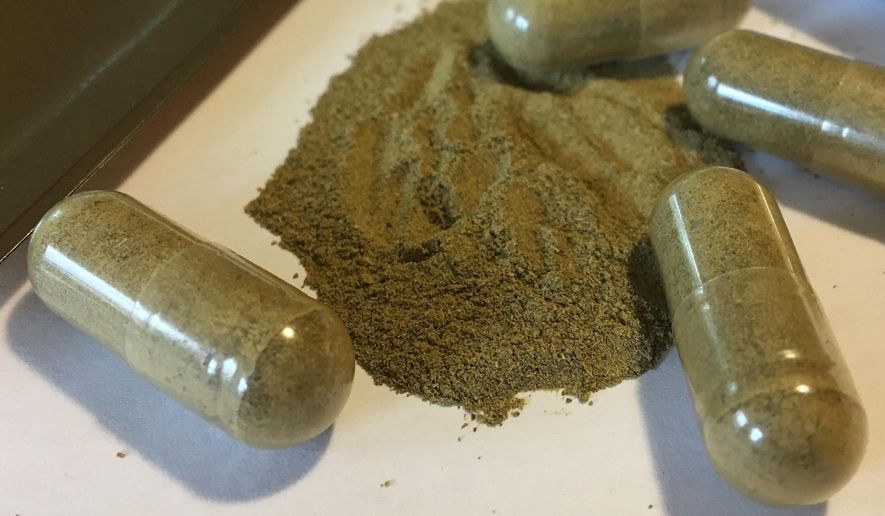Doctors believe the herbal supplement kratom caused newborns to exhibit withdrawal symptoms, as federal officials seek to classify the Southeast Asian plant as a dangerous opioid and activists defend it as a harmless pain reliever.
The Food and Drug Administration has documented at least five cases of babies born with neonatal abstinence syndrome, which doctors believe is linked to kratom.
The latest case report was published Wednesday in the journal Pediatrics. In it, kratom use was confirmed by the father, who said the mother drank it daily as a tea to manage opioid cravings and help her sleep during the pregnancy.
The mother told doctors she had been addicted to oxycodone for seven years but had been sober for two years prior to becoming pregnant.
Marketed as an herbal supplement in the U.S., kratom does not fall under Food and Drug Administration regulations. Its two main active ingredients — mitragynine and 7-hydroxymitragynine — are known to activate opioid receptors in the brain. But kratom isn’t known to cause respiratory depression like morphine or heroin, the main causes of overdose fatalities.
An estimated 2.1 million Americans have an opioid addiction. More than 60,000 people died from opioids in 2017.
The FDA has documented at least 44 deaths linked to kratom, but critics say nearly all of those cases involved other substances.
Supporters of the plant say it boosts energy, relives pain and curbs opioid withdrawal symptoms. It is consumed in dry powder form or mixed with water as a tea.
In the Pediatrics report, doctors wrote that the child was exhibiting classic symptoms of neonatal abstinence syndrome, including a high-pitched cry, sneezing, jitteriness, excessive sucking, abrasions to the face, irritability and stiff muscles.
But drug tests for both mother and baby came back negative for known substances. That’s when a family history was undertaken, and the father reported that the mother had been drinking kratom as a tea.
“It was not a substance I was familiar with, as well as most of my colleagues,” Dr. Whitney B. Eldridge, lead author of the report and a neonatologist for BayCare Health System in Tampa, Florida, told The Washington Times. “The lesson I took home for myself from this case is that I need to specifically ask about herbal supplements or other natural aids that mothers may use to help with opioid withdrawal.”
The child was treated with morphine and was weaned off, and was able to go home with the parents on its eighth day of life.
The FDA has cited five cases of neonatal abstinence syndrome linked to kratom, at least two in Canada and two in the U.S. — including Dr. Eldridge’s case.
The *fifth case occurred in Florida, Dr. Kirk Cumpston, the medical director of the Virginia Poison Center Virginia Commonwealth University Medical Center, told The Washington Times. Dr. Cumpston documented the case of the 1-day-old in a retrospective study of 15 hospital visits linked to kratom between 2002 and 2016.
It’s also unclear how many people use kratom. The American Kratom Association, which advocates for normalization of the plant’s use, says the number of users range between 3 million and 5 million people.
Responding to the Pediatric case report, FDA Commissioner Dr. Scott Gottlieb tweeted Wednesday that “Kratom is an opioid. There are no proven medical uses for kratom.”
Kratom is not federally illegal although a handful of states, cities and some counties ban the plant.
The FDA has placed the plant on import alert, seizing it at the border or ports of entry when it can, but the substance is easily bought online and shipped into the U.S.
In 2016 — in the wake of the 44 deaths — the Drug Enforcement Administration sought to emergency classify mitragynine and 7-hydroxymitragynine as a schedule I drug, effectively banning kratom. But a public outcry occurred, with tens of thousands of supporters mobilizing against the action.
The DEA then backtracked on their efforts and referred the matter to the Department of Health and Human Services to investigate possible benefits or potential for abuse of the plant.
“I think more research is needed to know how to classify kratom,” Dr. Eldridge said. “It may have a role to play in opioid dependency, but right now I think there’s just too little information to say what that role is.”
The FDA has continued promoting public warnings against the use of kratom. Between January 2017 and May, at least 199 people across 41 states became ill from salmonella-tainted kratom products.
Also, in May and September, the FDA sent warning letters to five companies for making “deceptive medical claims” that the plant can treat opioid addiction.
Dr. Eldridge said neonatal abstinence syndrome linked to kratom will likely increase as more women look for non-opioid alternatives for drug dependence.
“Because the opioid epidemic is so prevalent, I was hoping that this case would bring awareness of kratom to pediatricians and obstetricians,” she said. “Because it’s a widely available substance that I don’t think lot of people in the medical field know about.”
* (Correction: An earlier version of this article didn’t correctly identify the fifth case of neonatal abstinence syndrome linked to kratom as occurring in Florida. It was confirmed after publication and updated.)
• Laura Kelly can be reached at lkelly@washingtontimes.com.




Please read our comment policy before commenting.